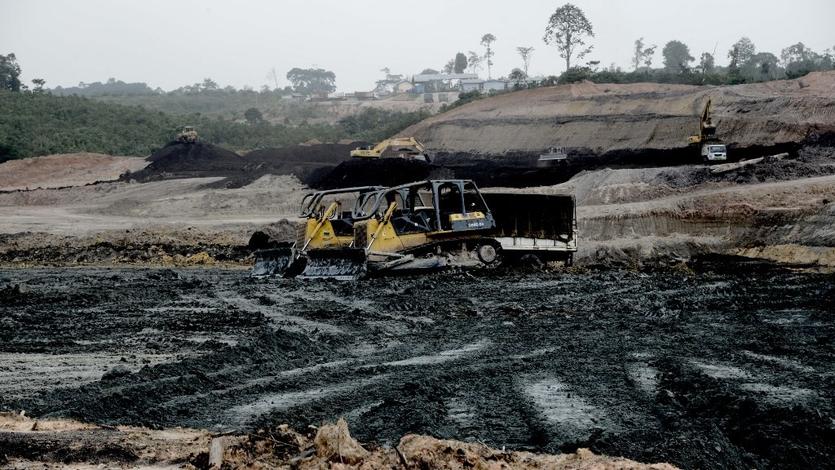 This picture taken on May 19, 2017 shows an open-pit coal mine in Jambi, south Sumatra, Indonesia. (GOH CHAI HIN / AFP)
This picture taken on May 19, 2017 shows an open-pit coal mine in Jambi, south Sumatra, Indonesia. (GOH CHAI HIN / AFP)
Indonesia's decision to lift its coal export ban, in response to lobbying by its key clients in Asia, underscores why the region continues to struggle with its climate commitments, experts said.
The Southeast Asian nation, the world's largest thermal coal exporter, announced on Jan 1 a monthlong ban on coal exports to avoid domestic outages caused by low coal supplies. It partially lifted the ban on Jan 13 after Japan, South Korea and the Philippines lobbied against the move.
Most Asian governments have signed the Paris climate treaty and have pledged to reduce carbon emissions to limit global warming to well below 2 C. But while there are moves to develop clean energy resources, experts said it will be difficult for Asia to wean itself away from coal-fired power plants since coal is cheap and plentiful.
READ MORE: Indonesia miners seek solution as coal export ban rattles sector
Renato Redentor Constantino, executive director of the Manila-based think tank Institute for Climate and Sustainable Cities, said fossil fuel capital is "embedded so deeply" in Asia's economies and is used in various sectors including manufacturing, energy and agriculture.
"This only emphasizes the risks of fossil dependence shared across economies that are also reeling from the increasingly severe impacts of carbon pollution," Constantino said.
The International Energy Agency said in its latest report that global power generation from coal is expected to have jumped by 9 percent in 2021, following an economic rebound that boosted electricity demand. Asia "dominates the global coal market", with China and India accounting for two-thirds of global demand. The IEA forecasts coal-fired power generation from 2021 to 2024 will increase 4.1 percent in China, 11 percent in India and 12 percent across Southeast Asia.
Asia needs a timely energy transition to (stop the) climate crisis, save humans and sustain our economy.
Tata Mustasya, climate and energy campaign strategist at Greenpeace Southeast Asia
Sisilia Nurmala Dewi, Indonesia team leader at 350.org, an international environmental organization, said the export ban has revealed that the coal market is vulnerable to supply shortages, which should encourage governments to make the shift to renewable energy sources. She cited the Asian Development Bank's decision to stop financing coal-powered plants and has urged other banks and financing institutions to do the same.
"Asia needs a timely energy transition to (stop the) climate crisis, save humans and sustain our economy," said Tata Mustasya, climate and energy campaign strategist at Greenpeace Southeast Asia.
Coal mining is an extractive industry, Mustasya said, and the time will come that coal reserves will be exhausted. As such, Asian countries must invest more on renewable energy sources such as solar power as "coal addiction (is a threat) not only the environment but also to the energy security".
The Southeast Asian country is a net exporter of coal but Indonesian coal miners must first meet their domestic market obligation, or DMO, before they are allowed to export. The DMO requires miners to supply 25 percent of their annual production to state-owned utility firm Perusahaan Listrik Negara at a maximum price of $70 per ton.
The price cap, however, falls way below current market prices that can hit as much as $250 per ton, pushing miners to flout the rules. Local supply was also aggravated by weather-related disruptions that reduced coal production in 2021.
Constantino of ICSC said the fact that more advanced economies like Japan and South Korea lobbied for Indonesia to relax the export ban also "shows how fragile their futures are".
"The image of high-tech, digital economies will remain questionable so long as they remain so dependent on an obsolete, industrial revolution-era fuel such as coal," he said.
ALSO READ: Limited impact likely seen from Indonesia's coal export ban
Constantino said this presents "a golden opportunity" for China to lead a coal-free future for Asia.
"Dependence on coal domestically remains strong in China, but it is clear the present will not define the future if China's intention to lead the world's climate protection agenda is supported and realized. China can be decisive in breaking from a past of harm by chasing a coal-free future where all, especially its partners among the Belt and Road countries, can enjoy the fruits of a truly modern, high-efficiency digital economy," he said.
Mustasya of Greenpace said an "ambitious" transition from coal-powered to renewable energy resources will require Asian countries to phase coal out by 2040. This can only be done if Asia stops investing in coal-powered plants now and retires existing ones as soon as possible.


